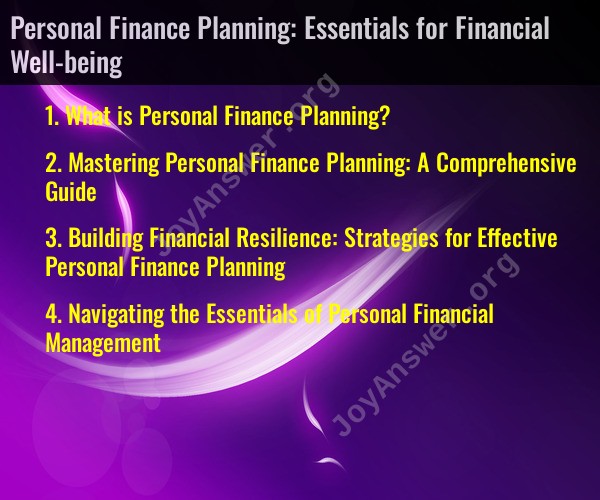What is Personal Finance Planning?
Personal finance planning refers to the process of managing one's financial resources to achieve financial goals, secure financial well-being, and make informed decisions about money. It involves assessing current financial situations, setting financial goals, and developing strategies to achieve those goals. Personal finance planning encompasses various aspects of an individual's financial life, including budgeting, saving, investing, debt management, insurance, and retirement planning. The goal is to create a comprehensive plan that aligns with an individual's values, priorities, and long-term objectives.
Key components of personal finance planning include:
Budgeting:
- Creating a budget to track income, expenses, and savings. A budget helps individuals allocate funds for essential needs, discretionary spending, and savings.
Savings:
- Establishing and maintaining an emergency fund to cover unforeseen expenses. Regular saving for short-term goals (e.g., vacations) and long-term goals (e.g., home purchase, education) is also a crucial aspect.
Investing:
- Developing an investment strategy based on financial goals, risk tolerance, and time horizon. Investments may include stocks, bonds, mutual funds, real estate, and retirement accounts.
Debt Management:
- Managing and reducing debt responsibly. This may involve creating a plan to pay off high-interest debt, such as credit cards, and considering strategies for managing other loans.
Insurance Planning:
- Evaluating insurance needs, including health insurance, life insurance, property insurance, and disability insurance. Adequate insurance coverage helps protect against unexpected financial setbacks.
Retirement Planning:
- Planning for retirement by contributing to retirement accounts (e.g., 401(k), IRA) and considering factors such as desired retirement age, lifestyle, and income needs in retirement.
Tax Planning:
- Understanding tax implications and optimizing tax strategies to minimize tax liabilities. This may involve taking advantage of tax-advantaged accounts and deductions.
Estate Planning:
- Creating an estate plan to manage the distribution of assets and provide for loved ones in the event of disability or death. This includes creating wills, trusts, and powers of attorney.
Financial Education:
- Continuously educating oneself about personal finance topics, staying informed about economic trends, investment opportunities, and changes in financial regulations.
Review and Adjust:
- Periodically reviewing and adjusting the financial plan based on changes in personal circumstances, financial goals, and economic conditions.
Personal finance planning is a dynamic and ongoing process that evolves with life stages and changing financial circumstances. It empowers individuals to make informed decisions, build financial resilience, and work towards achieving their financial aspirations. Seeking the guidance of financial professionals or advisors can also be beneficial in developing and implementing an effective personal finance plan.
Mastering Personal Finance Planning: A Comprehensive Guide
Taking control of your finances is one of the most empowering things you can do for your future. It grants you freedom, security, and the ability to pursue your dreams. But where do you start? This comprehensive guide will equip you with the knowledge and strategies to navigate the world of personal finance with confidence.
1. Understanding Your Financial Landscape:
Track your income and expenses: The first step is to gain a clear picture of your financial inflows and outflows. Use budgeting apps, spreadsheets, or simply a notebook to record your income and expenses for a month. This will reveal spending patterns and areas where you can save.
Calculate your net worth: Subtract your liabilities (debts) from your assets (savings, investments, etc.) to determine your net worth. This number represents your overall financial health and provides a benchmark for tracking progress.
2. Setting Financial Goals:
- Short-term: Define goals you want to achieve within a year, such as paying off a credit card debt or saving for a vacation.
- Mid-term: Focus on goals requiring 3-5 years, such as saving for a down payment on a house or a car.
- Long-term: Envision your retirement lifestyle and plan accordingly. Contribution to retirement accounts and long-term investments are crucial.
3. Budgeting and Saving:
- Create a budget: Allocate your income towards essential expenses, savings goals, and discretionary spending. Tools like the 50/30/20 rule can be helpful.
- Build an emergency fund: Aim for 3-6 months of living expenses to cover unexpected costs like car repairs or medical bills.
- Automate savings: Set up automatic transfers to your savings and investment accounts to ensure consistent progress towards your goals.
4. Debt Management:
- Prioritize high-interest debt: Tackle credit cards and other loans with the highest interest rates first to minimize the total amount you pay.
- Explore debt consolidation: Consider consolidating multiple debts into one loan with a lower interest rate to simplify repayment.
- Avoid new debt: Be mindful of unnecessary borrowing and focus on living within your means.
5. Investing for the Future:
- Understand your risk tolerance: Assess your comfort level with potential losses before investing. Higher potential returns often come with greater risk.
- Diversify your portfolio: Spread your investments across different asset classes (stocks, bonds, real estate) to mitigate risk.
- Start early and invest regularly: Time is your greatest asset in investing. The power of compound interest can significantly grow your wealth over the long term.
Remember, personal finance planning is a journey, not a destination. It requires ongoing effort and adjustments as your life circumstances change. Don't be afraid to seek professional help from a financial advisor if needed.
Additional Resources:
Building Financial Resilience: Strategies for Effective Personal Finance Planning
Navigating the Essentials of Personal Financial Management
By following these steps and staying informed, you can master personal finance planning and build a secure and prosperous future for yourself.










